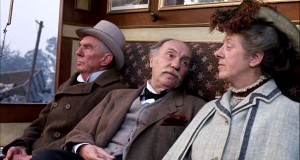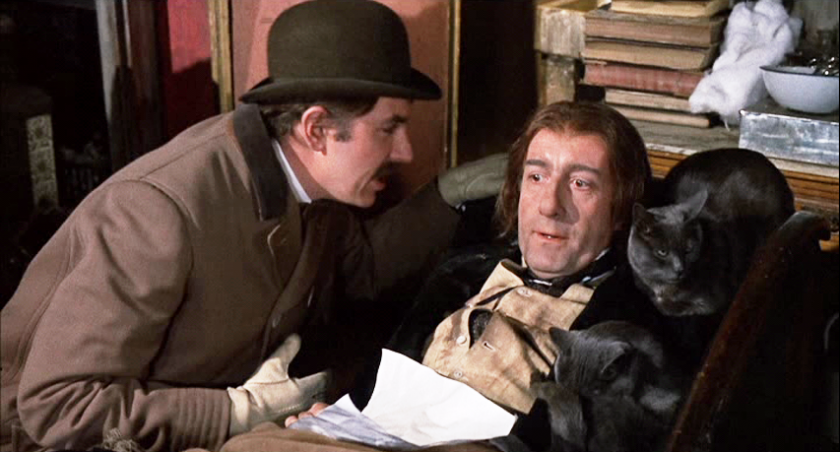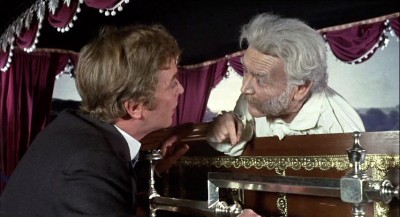
Perhaps no major filmmaker is as completely overlooked today as Bryan Forbes—the handsome actor-writer who turned director in 1961 with Whistle Down the Wind—and I’m not sure why, but his name is apt to draw blank looks today. (He’s sufficiently obscure that one of his films—a rather nice documentary on Elton John from 1973 called Say Goodbye, Norma Jean, and Other Things—is generally omitted from both his and John’s filmographies.) That’s too bad, because the best of Forbes is very good indeed—and if you don’t know his work, there’s perhaps no better place to start than The Wrong Box (1966), his dark (but cheerfully so) comedy adapated from the Robert Louis Stevenson-Lloyd Osborne novel. The film more or less follows the plot of the novel about the last surviving members of a tontine battling over who’s the last man standing and wins the tontine, but with—let’s call it—added dementia and an all-star cast of British actors and comics.

If you don’t know what a tontine is, Ralph Richardson’s prosy old bore Joseph Finsbury (“I state facts only—no opinions—and this fascinates everyone I meet”) explains it several times over the course of the film. Essentially, it’s a kind of lottery with money being held—and invested—for children with the last survivor inheriting it all. At the time of the story, that comes down to Joseph and his brother Masterman (John Mills). Joseph has two wards—played by Peter Cook and Dudley Moore—who are after the money, which Masterman is determined to win it (even to murdering Joseph) so as not to leave his medical student son (Michael Caine) “an idiot in a profession of rogues and charlatans.” The real trouble begins when the two wards become convinced that Joseph has been killed in a train wreck (he hasn’t) and try to hide what they believe is his body. From there it gets really—and deliciously – complicated.

The film—though receiving a good deal of critical praise—was not a success at the box office, which I blame more on the atrocious poster art and the lack of a really big name at the top of the cast (Michael Caine was not quite a household name in the States yet, which is to say the U.S. release of Alfie had not happened). And it’s very, very British (as witness Bryan Forbes’ credit). Some will maintain that a certain air of cheapness undermines the film—detractors just love pointing out that TV antennae are visible on the roofs of Victorian London houses—but I’ve never found that to bother anyone, unless they were wanting to be bothered by it. What you get in exchange for a few rough edges more than makes up for them.

And what do you get? Well, you get an amazing cast who are all in the spirit of the lunacy of the thing. Ralph Richardson’s performance is quite probably my favorite in his entire body of work. To see and hear him bumble through the film spouting his “facts only” completely oblivious to the effect it has on those he meets is sheer joy. Even though they are not the stars, this may just nudge out Bedazzled (1967) as the best of Peter Cook and Dudley Moore’s screen work. Without question, it’s the film in which they best created actual characters. Some mention should be made of Brit character actor Wilfrid Lawson as the aged, alcohol-soaked and generally out-of-it butler Peacock. His way with lines like, “I have heard that in this great city, there are men—unscrupulous men, sir—who, for a price, will perform the most unsavory tasks,” is one of the delights of the film.

But best of all there is Peter Sellers’ “accomodating” Dr. Pratt—a shady, drunken medico who lives surrounded by innumerable cats (“Don’t sit on that moggy, sir, she’s the finest ratter in the East End”), performs abortions, and will undertake just about anything for a fee. For purposes of the film, he’s called on to provide Peter Cook’s character with a death certificate (“How many do you want?”), though he obviously doesn’t stop at that. At one point, Cook rouses the doctor from a stupor (“I assure you the lady was already dead when I arrived, constable”) and finds himself mistakenly offered a jar of “black currant jelly—contains 12 grains of arsenic—just spread it on your mother’s bread and butter.” He only has two scenes, but those two scenes, for my money, are the finest things Sellers ever did. They’re both darkly funny and yet by the end of them, he’s managed to make his venal Dr. Pratt oddly touching. There are certainly other reasons to see the film, but Sellers makes it absolutely essential viewing.



Yes, anyone who hasn’t seen this simply must.